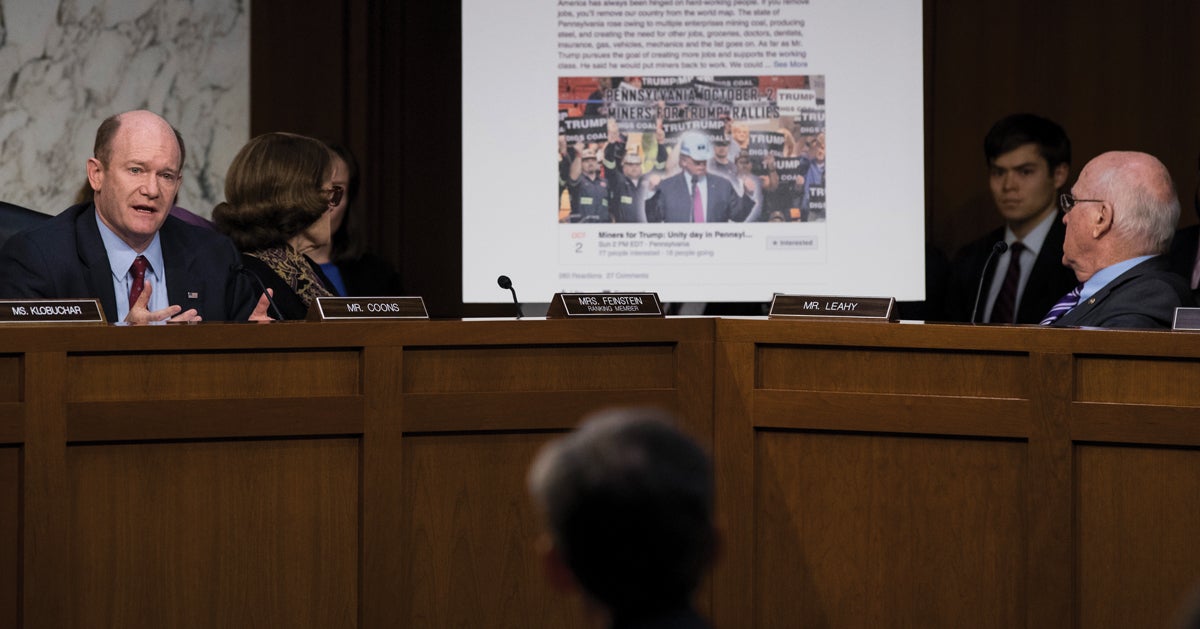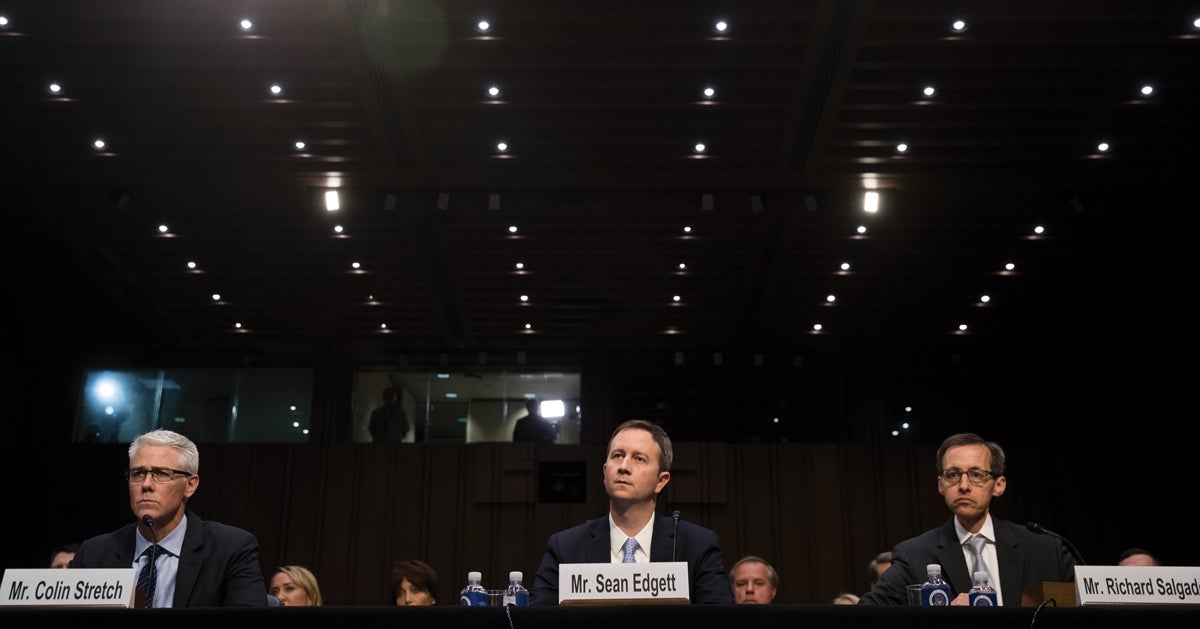A central idea behind the First Amendment’s protection of free speech is that a free marketplace of ideas better serves the search for truth than does a small elite armed with the power of censorship. Accordingly, the solution to bad speech is more speech, not less. That theory, however, is being set aside by lawmakers determined to make sure that no citizen’s political opinions are manipulated by foreign powers peddling fake news on the internet.
In 2017, a number of senators, led by Amy Klobuchar (D-Minn.), introduced the “Honest Ads Act” in response to revelations that the Russian government attempted to spread disinformation on the internet to American voters during the 2016 election. The previous Congress did not pass the bill, but it was reintroduced in the Senate in May 2019 and may yet pass. The bill seeks to extend to the internet the kind of reporting requirements found in campaign finance laws.
To prevent a few bad actors from spreading lies, the Honest Ads Act chills virtually all sponsored political speech online.
Klobuchar appeared on “Meet the Press” in February 2018, to discuss the bill. So focused was host Chuck Todd on the threat of fake news, that he neglected to ask Klobuchar any question raising First Amendment concerns. He did ask, however, if the government should fine social media companies that fail to remove automated accounts, or “bots.” Klobuchar said: “I think that would be a great idea.”
But there are First Amendment concerns aplenty about the bill. It makes it financially expensive and legally risky for all but the largest organizations to speak on the internet on matters of public importance. To prevent a few bad actors from spreading lies, the bill chills virtually all sponsored political speech online.
From Information Superhighway to Information Checkpoint Charlie
To understand the truly breathtaking changes being proposed by Klobuchar and others, consider the laissez-faire history of political advocacy on the internet. Online campaigning was barely on the radar the last time Congress overhauled federal campaign finance laws in 2002. That turned out to be a blessing.
The first candidate to be widely credited with a successful online operation was Howard Dean two years later, in his run for the Democratic nomination for president. Though Dean’s campaign flamed out memorably, his online success became a model for others. In 2008, Barack Obama won not only the Democratic nomination but the presidency on a campaign that used digital tools heavily. Notably, this development was cheered, not criticized, by the mainstream media.
Democrats may have been first to capitalize on the internet’s potential but make no mistake: Conservatives use the internet to support their causes as well.
Just as President Obama’s supporters turned to the internet to mobilize, so did his critics. Conservative leaders and pundits reached larger audiences than ever before through YouTube and right-leaning blogs. Conservative advocacy groups and government watchdogs created Facebook pages to get closer to their supporters. Local activists turned to Twitter and Reddit to spread their messages. New data tools empowered groups of all beliefs to identify and reach out to potential supporters at low cost.
By the 2016 election, Republican nominee Donald Trump was being propelled to success, in part, by a strong social media strategy. The internet’s low cost and interactive, share-what-you-like nature helped Trump defeat Hillary Clinton despite being outspent 3-to-1.
Where the internet was once an afterthought for politicos, online strategies are now a core component of most campaigns. Key to this evolution was a bipartisan recognition that the internet should not be heavily regulated like television and radio—after all, the internet is not like television and radio.
While advocacy for or against a candidate had been regulated since the 1970s, the Bipartisan Campaign Reform Act of 2002 went further to regulate television and radio ads that simply name a candidate near an election. Groups that spend over $10,000 in a calendar year on such ads and reach an audience of at least 50,000 people now must register with the government, file complex reports documenting their spending and the identities of some of their supporters, and include lengthy disclaimers in their communications. States have their own laws regulating political speech, which often expose the names and home addresses of Americans who support groups that mention elected officials in the context of discussing policy issues. Complying with the various state and federal regulations raises the cost of speaking, but the rules are at least limited to groups spending large sums to reach large audiences in the period leading up to an election.
By contrast, the cost of promoting a message on the internet is nowhere near as high as a major television advertising campaign. As a result, proposals to regulate online speech typically start at much lower thresholds for spending, and therefore affect much smaller groups. And unlike the typical 30-second ads we see on television, the internet offers the potential for speech to come in all different shapes, sizes, and formats. This variety in advertising frustrates efforts to impose TV-like disclaimer and reporting requirements on online speech.
In addition, internet content is often interactive: It asks users to participate in polls; it allows them to rate content; it invites them to comment; and it almost always provides links for users to get more information. The nature of advertising on the internet is also ever-changing with new technological innovations and new ways of reaching people. Regulators should not stifle future innovation with a one-size-fits-all approach.
 The Senate Judiciary Subcommittee on Crime and Terrorism holds a hearing on “Extremist Content and Russian Disinformation Online” on Oct. 31, 2017. credit: Drew Angerer/Getty Images
The Senate Judiciary Subcommittee on Crime and Terrorism holds a hearing on “Extremist Content and Russian Disinformation Online” on Oct. 31, 2017. credit: Drew Angerer/Getty Images
These points used to carry the day when restrictions on internet speech were proposed, but a funny thing happened after Trump’s unexpected victory in the 2016 election. Attitudes toward the internet began to sour. Instead of continuing to celebrate its success in elevating new voices, now critics attacked the internet as untrustworthy and in need of government oversight. The revelation that Russian groups had purchased a small amount of politically charged online ads for roughly $100,000—0.01 percent of the $1.4 billion in digital ad spending in the 2016 election cycle—fanned the flames for intervention.
This negligible amount of Russian spending, and the laughable “memes” they produced, became a justification for old enemies of free speech to rally around a new cry: Regulate the internet!
There are always powerful politicians and activist groups seeking to control debate. In recent years, their efforts have focused on silencing advocacy nonprofits through donor disclosure laws. These laws expose the names, home addresses, and even the employers of Americans who financially support advocacy groups that speak out in support of a cause. It’s a way for government, activists, and even crazed individuals to track and possibly harass supporters of particular causes. Think of your local pro-life group, the taxpayers’ association in your town, or even the National Rifle Association.
 Colin Stretch, general counsel at Facebook, Sean Edgett, acting general counsel at Twitter, and Richard Salgado, director of law enforcement and information security at Google, testify at a Senate Judiciary Subcommittee on Crime and Terrorism hearing on “Extremist Content and Russian Disinformation Online” on Oct. 31, 2017. credit: Drew Angerer/Getty Images
Colin Stretch, general counsel at Facebook, Sean Edgett, acting general counsel at Twitter, and Richard Salgado, director of law enforcement and information security at Google, testify at a Senate Judiciary Subcommittee on Crime and Terrorism hearing on “Extremist Content and Russian Disinformation Online” on Oct. 31, 2017. credit: Drew Angerer/Getty Images
How Bills Regulating Internet Speech Threaten the First Amendment
A closer look at the “Honest Ads Act” reveals it is nothing like its marketing suggests. Rather than a defense against foreign meddling in elections, the bill applies to Americans who use the internet to speak with other Americans about political affairs and the issues of the day. It has gone nowhere in Congress, so far, but it has inspired a plethora of state-level imitators—some of which have been signed into law. These bills represent some of the most serious threats to free speech rights today.
The basic structure of these online speech laws is the same. Each expands the types of ads regulated by the government, often going so far as to regulate any paid ads about any “national legislative issue of public importance.” The bills frequently require inflexible disclaimers that could make many smaller online ads impractical. Especially as online
technology continues to develop, it may be impossible for speakers to comply with these static disclaimer requirements. The bills would also require groups running political and issue ads to file complex reports with the government—sometimes including donor disclosure (surprise, surprise). Of course, there are substantial fines and penalties for violations, even minor ones, and the potential for politically motivated investigations.
The end result? The internet would become less useful to grassroots campaigns and average Americans trying to speak. At the same time, such restrictions would pose little obstacle to well-funded interest groups and candidate campaigns; they can better afford to pay for the legal guidance needed to navigate a more heavily regulated internet.
On top of all that, online speech bills typically include a “public file” requirement, whereby the group running the ad—and the platform (Facebook, Twitter, your local newspaper) that accepts it—must report detailed information such as how much the ad cost, to whom they promoted it, how many views it generated, a list of the group’s Board members and officers, and other minutiae. Studies suggest these reports are of little value to voters, but they serve as roadmaps for a group’s opposition. Knowing exactly what a group is saying, to whom, and at what cost can be tremendously valuable to savvy political operatives trying to halt their progress. Unfortunately, with the threat of government action looming in the background, companies like Facebook and Twitter have begun constructing these databases themselves.
While the Honest Ads Act has not yet become law, it has been the model for numerous state bills regulating speech on the internet. In 2018, Colorado, Idaho, Maryland, New York, North Carolina, Vermont, Virginia, and Washington all considered bills modeled after the Honest Ads Act. Maryland, New York, and Washington did pass such bills into law. This year, Colorado, Connecticut and North Carolina are considering bills similar to the Honest Ads Act. Those bills either impose new disclaimer rules on internet ads, require internet platforms to publish information about ad-buyers, or regulate online ads as electioneering communications.
Without an internet free from government interference, the marketplace of ideas is less open and much smaller. In order for the internet to continue to organize and motivate Americans in public life, it must remain free from heavy-handed regulation.
In Maryland, the law is so impossibly broad that it covers online speech that merely “relates to” a candidate, prospective candidate, ballot question, or prospective ballot question. So, virtually any political speech online may fall within its dragnet. In Washington, bureaucrats made an already bad law even more complex by requiring platforms to provide “the geographic location and audience targeted” by the ad and “the total number of impressions.” The restrictions in Maryland and Washington were so severe that tech giant Google decided to stop running state-level political ads in both states, at least temporarily, while Facebook announced it would no longer accept political ads in Washington in order to avoid violating its new regulations. If these two tech behemoths have difficulty complying with these laws, smaller outlets will never be able to meet the law’s requirements.
Maryland Gov. Larry Hogan declined to sign his state’s online speech law, noting its First Amendment problems. However, he allowed the measure to become law without his signature. Sure enough, a lawsuit was quickly filed by a coalition of media organizations, including The Washington Post and The Baltimore Sun. They argue Maryland violated their First Amendment rights by forcing them to publish information about their advertisers and contend that the law imposes unfair burdens on the media. In early January, a federal judge issued a thorough opinion casting doubt on the constitutionality of Maryland’s law, but the challenge is still working its way through the legal process.
If these and similar efforts to restrict online political speech are successful, we may lose the internet as a vibrant space for discussion about government and candidates. The legacy of the internet as a space for new voices and a counterweight to television and radio could one day be a mere memory. In its place would be yet another highly-regulated, expensive media platform dominated by big companies, well-heeled D.C. insiders, and expensive lawyers.
Saving Free Speech Online
The fight to save free speech online puts conservatives in an unusual position. Silicon Valley has a reputation for leaning left, and accusations that platforms are biased against conservatives are a common topic of discussion in right-leaning media. However, if the government is allowed to regulate political speech online, the situation will get far worse for grassroots campaigns of all stripes. As Ronald Reagan once quipped, the nine most terrifying words in the English language are: “I’m from the government, and I’m here to help.”
This new front in the battle for free speech should unite Americans of all backgrounds. If foreign governments are trying to interfere in our elections, state campaign finance laws aren’t the solution. Does anyone really believe the Russians or the Chinese are going to obey American campaign finance regulations anyway? The federal government has agencies that specialize in dealing with hostile actors online, and burdening Americans’ free speech rights with a litany of regulations will not make it easier for them to do their jobs.
Not since the introduction of the printing press has there been a tool that has so drastically changed the way we communicate with one another. The internet is where many Americans go to share their views and learn about the views of others. It is where they go to organize petitions, rallies, and voter registration drives. It is one of the main sources for information about government, public policy, and elections. Without an internet free from government interference, the marketplace of ideas is less open and much smaller. In order for the internet to continue to organize and motivate Americans in public life, it must remain free from heavy-handed regulation.
More proposals to regulate online speech laws are sure to come in 2019 and beyond, both in Congress and in states across the country. Now is the time for defenders of free speech to be vigilant against efforts to restrict speech online. Otherwise, we will find we have lost our rights—and
our voices!
Mr. Nese is the director of external relations at the Institute for Free Speech, the nation’s largest organization dedicated solely to defending First Amendment political speech rights. Mr. Wachob is the communications director at the Institute for Free Speech.
